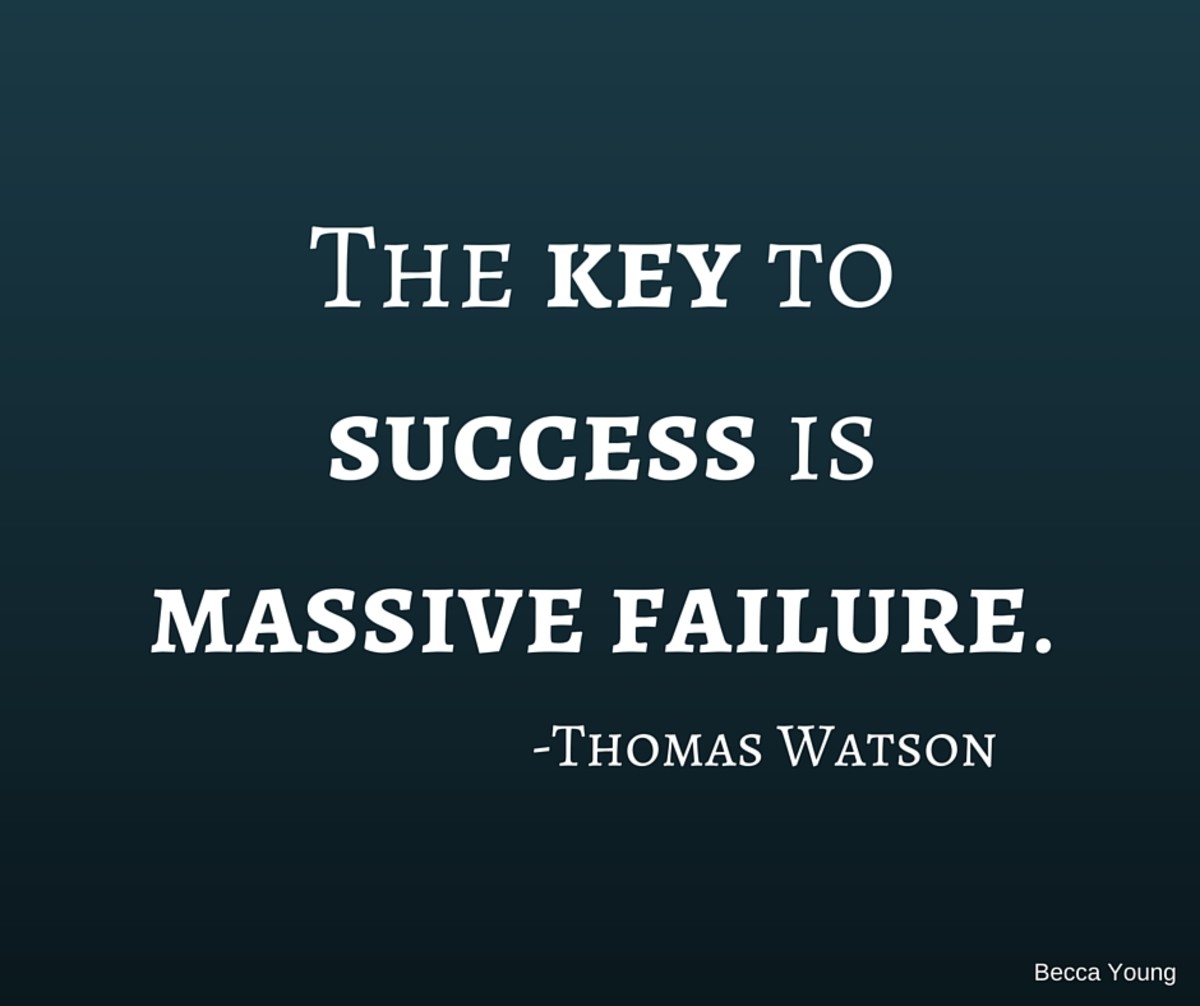- HubPages»
- Health»
- Quality of Life & Wellness»
- Personal Development
Five Top Reasons People Succeed Regardless of Education or Intellect
The popular belief in society is that higher education brings success, and intelligence can bring you out on top through life's hardships. Why, then, are some of the world's most successful people high school or college dropouts? Why do people of average intelligence sometimes far outstrip the success of people who are above average? Sure, you can argue that they have connections, or started out with money, or any of the popular excuses. The truth is, many did not start out with what we'd call "advantages," yet they still found a way to reach a high level of success. Let's first examine the education part. Do you think that you must have college to be successful? Let's see if you recognize any of these dropouts (if you don't recognize them, look them up for some great success stories):
- Bill Gates
- Henry Ford
- Michael Dell
- John D. Rockefeller
- Mark Zuckerberg
- Steve Jobs
- Matt Mullenweg
- Richard Branson
- Ralph Lauren
Heck, Einstein failed to hit the minimum on entrance exams more than once, and thought himself a stupid man through much of his life. So -- if it's not intelligence, education, or even connections in life, then how do people achieve success? Here are five reasons that successful people achieve their goals, and they're five things that absolutely anyone can do as long as you have a pulse and some communicating neurons.

Reason #1: People bound for success have confidence that they can achieve their goals
Before you can get where you're going, you first have to believe that you can make it to the finish line. How many times have you felt like you're not good enough to do what you want to do, or that your idea just won't hold water in the marketplace? How many times does it keep you from doing anything at all? This is one of the biggest success killers in the world today. No matter how well-educated or how intelligent you are, you will not be successful if you don't actually believe you can add value to the world.
Reason #2: Successful people believe that they deserve it
Sounds weird, doesn't it? Of course you believe that you deserve success. Right? After all, you work really, really hard. You use all of your mental faculties. You take action on every single one of your ideas that might have some merit. You bring value to the world that no one else could, and success is a fair exchange of that value. You're awesome, so any success that comes your way is your rightful due for all the awesomeness you bring to the world. Wait -- did I lose you somewhere in there? Then you, too, may believe that you don't actually deserve success.
The belief that you don't deserve success usually isn't a conscious one. In fact, most people have no idea why they're not advancing on their chosen path. In many cases, it's because they believe, at some level, that someone else can do it better. Maybe they think that the value they have for the world isn't actually all that valuable. Think about this like asking for a raise. If you ask your boss for a raise, you might get it and you might not. If you never ask, you won't get it. If you simply accept what comes your way, there's a good chance that you'll always be at the bottom of the heap and will never be properly compensated for what you actually bring to the table.
Let's take a look at this one. Do you bully yourself, and does it impact your life?
To what extent do you think negative self-talk influences you?
Reason #3: Successful people are nice to themselves
Okay, it's great to have a day of pampering every now and then, or give yourself a treat for a job well done. While that's a great thing to do too, what we're really talking about here is the way you treat yourself on a daily basis. Are you a bully to yourself, or do you offer yourself kindness and encouragement? For instance, you drop a plate on the floor. Do you say, "Holy crap, you're such a stupid klutz! Why can't you just pay attention??" Or do you say, "Oops, guess it's time to sweep the floor."
Whichever one you choose, how would your response differ if it was one of your family members who dropped the plate? For a lot of people, the knee-jerk reaction for one's own mistake is to berate themselves, but treat others with moderation and care. My child or my husband would already feel bad enough about dropping the plate, so I'm going to be reaching for the broom while I let them know it's no big deal and make sure they didn't cut themselves on broken shards. Can you imagine saying the first thing to your young child, or the well-meaning spouse who is washing or putting away dishes? The sad thing is, most of us can see saying it to ourselves. Why is it okay to treat ourselves like crap? The truth is, it's NOT okay.
Put simply, successful people are at least as nice to themselves as they would be to others. They work to reserve judgment, go sparingly on criticisms and negative commentary, and offer praise whenever it's deserved. On a bad day, these people offer themselves encouragement and look at the bright side of life rather than constantly redirecting to everything that's bad. If you treat other people badly, you're a bully and an a-hole that no one wants to be around. It is the same when you treat yourself badly, even if no one else knows about it except yourself. You can't be mentally healthy, happy, or successful until you get a handle on all the horrible things you say to yourself.
Stuck on how to fix negative self-talk? These exercises might help

Success isn't easy, but you can't cross the finish line if you never even start the race

What are common motives in other people?
- Help you in the context of their experiences
- Keep you from changing
- Use your efforts to help themselves
- Get something from you for nothing
- Keep you dependent on them
- Make sure you succeed, but a little less than they do
- Want you to conform to their ideals
Reason #4: Successful people don't let others' opinions determine their path
People have advice and opinions. Pretty much everyone. In fact, well-meaning people who truly care about you will offer advice, often not realizing that it could be the worst possible advice for you. Think you have a great idea, but others say it just won't work? That's not to say that you should completely ignore what others have to say, but don't let their word be the final decision on your life. Take their points into consideration, bear in mind that they could actually be wrong, and move forward based on your own thoughts and beliefs.
Also bear in mind that not everyone wants you to succeed. In fact, it might surprise you who doesn't. Even some of your best friends, your parents, your siblings or spouse may stand in the way of your success. It doesn't mean they don't care about you or want to hold you down, but they may have a deep-rooted belief that your success means you will change. You may move away from them, and may even find those people irrelevant in your life. Just because the idea seems absurd to you, doesn't mean it does to them. On the same token, be extremely wary of the motives of people around you -- acquaintances, friends, co-workers -- who may only seem to have your best interests at heart.
Catch yourself caring too much about what others think?

Don't believe me about the importance of taking action? Hear it from Jack Canfield
Reason #5: Successful people take action
Simple? Yes. It's also the one thing that over 99% of people in the world never do. They say that the journey of a thousand miles starts with one step. It's true, but doesn't do anything for you if you're still sitting on the couch and wondering why you're no closer to your personal form of success.
What does your success look like? Maybe you want to write a book. Naturally, that means you have the first sentence written, right? For a lot of people, that's just not the case. It's one thing to think about what you want to do with your life and the type of success you want to achieve, but it's another thing entirely to actually do something about it. Taking just one step forward already puts you way ahead of most people who are not succeeding in the way they want.
People who are not successful also often have difficulties making a decision. On the flip side, successful people make decisions quickly and often. Are they the right decisions? Not always. Sometimes it's not even the majority of the time. If you have a question, though, there's nothing that can answer it except to try something. Thomas Edison is famously quoted as saying, when asked if he felt discouraged by his "failures," that he didn't fail, but instead "found 999 ways not to make a light bulb." Whether Edison actually said it or not is under debate, but the concept remains true -- when you try something, you'll either find out that it works or find out that it won't. If you sit and worry about the outcome of your decision, all you'll know is that you don't know.
Like the video above? Here's one of the best-known books from the guy who made it

So...how far have you gotten on your road to success?

Sound too simple? Or maybe too overwhelming? Let's recap
Okay, so there's no huge secret to success. The process is simple, but it's not easy. Sometimes it's not even easy to see why we're not getting anywhere. It's also easy to discount the importance of a healthy mindset and mental well-being. In fact, most people want to put mental health and a positive outlook behind education and intelligence. The result? A whole bunch of intelligent, over-educated people who are just as stuck in the mud as they were before. They're miserable, and now they have a bunch of student loans on top of their woes over lack of success.
Whether you call it the law of attraction, or reaping what you sow, or just plain treating yourself the way you'd treat others, it all starts with the positive mindset. Once you figure out how to get past the worst challenges in your own mind, it's just a matter of taking small steps consistently and at every opportunity.
Does this hub mean that education is a bad thing, or intelligence is worthless? Not at all. It does mean, however, that having those things doesn't guarantee success, and not having them certainly doesn't guarantee failure.
I hope this hub has been helpful. What do you think? Is this over-simplified, or is it really what it takes to become successful? Does it really take a "special advantage" in life in order to be one of the "successful ones"? Or, is success actually a possibility for anyone? I'd love to read your thoughts in the comments section, and feel free to ask questions or suggest topics for additional hubs.
Working toward being successful in business? These other hubs may help
- How Unhappy Employees are a Liability to an Organiza...
Unhappy employees can trash your company fast. This person may talk badly about your organization, won't be efficient at bringing in new customers, and may bring negativity into the workplace. - How to be a Successful Freelancer
Freelancing has been a great, legitimate way for people to work from home, to work while unemployed, or to create your own business at home. Here are some essential pieces to ensure your freelancing success. - Does Business Success Come From Practicing Good Ethi...
Business ethics are essential for any consciencious business owner or corporate upper managment. However, are ethics necessary for overall success in business? Here's a look at how business ethics have or haven't been used in modern business, and wha - How to Take a Break When Working from Home: Tips for...
Working from home often leads to overwork, burnout, and a blurred distinction between work and the rest of life. Here are tips to work from home, but still take a break and live from home.
© 2014 Rebecca Mikulin








